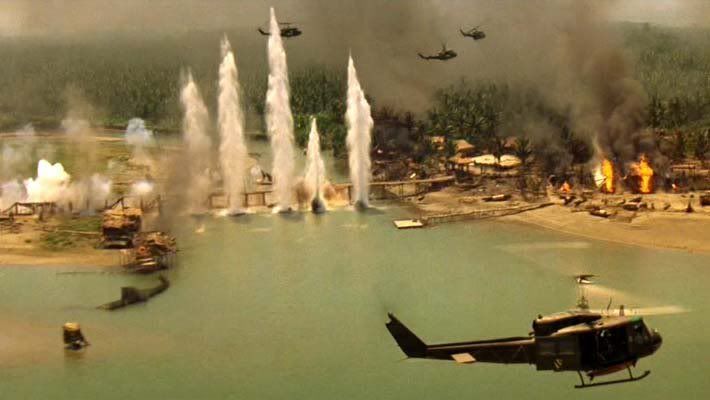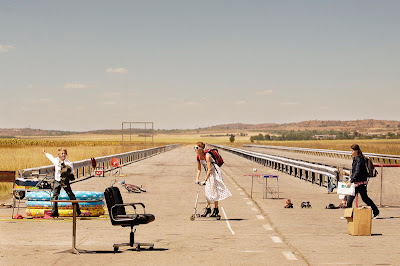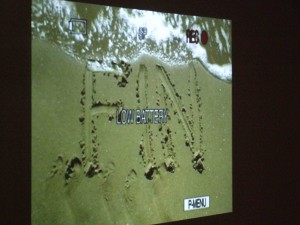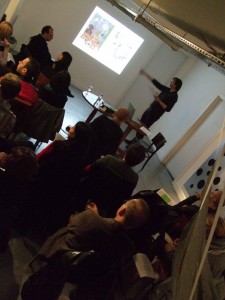-
Architecture
archive
art
Ballard
body
China
cinema
ecology
education
Europe
Ezra Pound
futurology
gothic
image
law
Literature
London
magic
memory
Modern
Modernism
museums
music
novel
performance
photography
poetry
politics
radical philosophy
science
science fiction
Sinclair
Situationism
sound art
Surrealism
technology
television
the avant-garde
The Future
Theory
thomson
time
Urban
visual culture
war
Posts tagged The Future
CSD Accelerationism Workshop, May 23rd
Tagged as radical philosophy, technology, The Future

From our friends in the Centre for the Study of Democracy:
Accelerationism: A Workshop
May 23rd 2014, 11.00-4.30 (Closed Workshop), 6-8 (Open Plenary)
University of Westminster, 309 Regent Street, London
The Centre for the Study of Democracy invite you to a workshop on the emerging theme of ‘accelerationism’ – an attempt to recuperate the liberating potential of reason, technology, and modernity. In the wake of ongoing economic, environmental, and social crises, accelerationism argues that the proper response requires unleashing these potentials from their current strictures, and avoiding tendencies towards localism, primitivism, and romanticism. Accelerationism seeks to name a general disposition already underway in disparate fields such as politics, philosophy, science, engineering, and design.
This workshop aims to open and extend a discussion on accelerationism: bringing together the supportive, the sceptical and the curious to debate the philosophical underpinnings and political implications of the concept as well as ‘actually existing accelerationisms’. Speakers include: Benjamin Noys, Patricia Reed, David Cunningham, Helen Hester, Benedict Singleton, Richard Barbrook, Ben Woodard.
This will be followed by an open plenary in The Boardroom at Regent Street entitled: ‘Occupy the Future: Is a Promethean Politics Possible?’, with Nick Srnicek & Alex Williams (authors of Manifesto for an Accelerationist Politics), Rachel Armstrong and Craig Gent (Plan C).
Archives for the Future: An Art and Visual Culture Conference, March 29
Tagged as archive, art, The Future, visual culture

Saturday 29th March 2014, 9.00-5.00
Fyvie Hall, University of Westminster, 309 Regent Street, London W1B 2HW
Organised by Mnemoscape with the support of the Institute for Modern and Contemporary Culture and the International Association for Visual Culture.
Keynote Speakers: Francis Gooding (Birkbeck) and Uriel Orlow (Westminster)
Archives are becoming increasingly fetishized and (an)aestheticized in contemporary art practice and academic discourse. Archives have generally been considered as conservative institutions aimed at preserving the past in the present – and so perpetuating the traditional structures of power. In contrast, this conference is interested in bringing to light the generative and creative side of the archive. How can archives be used to generate the ‘new’ and to convey possible alternatives to the present status quo? How can we turn archives from historical records into instruments of future planning and agencies of radical thinking?
Full programme now available at: http://archivesforthefuture.wordpress.com/programme/
For any further information about the conference, please contact the conveners, Elisa Adami and Alessandra Ferrini at mnemoscape@gmail.com
Call for Papers: Archives for the Future: An Art and Visual Culture Conference
Tagged as archive, art, The Future, Theory, visual culture

Archives for the Future: An Art and Visual Culture Conference
Organised by Mnemoscape and supported by the IMCC.
Call for Papers: Deadline submission: 18 November 2013
Archives are becoming increasingly fetishized and (an)aestheticized in contemporary art practice and academic discourse. This conference comes out of a shared sense of frustration at this. In response, it intends to explore the present and futuristic potential embedded in the archive. Archives have generally been considered as conservative institutions aimed at preserving the past in the present – and so perpetuating the traditional structures of power. In contrast, we are interested in bringing to light the generative and creative side of the archive, what Derrida has defined as its ‘institutive’ power. How can archives be used to generate the ‘new’ and to convey possible alternatives to the present status quo? How can we turn archives from historical records into instruments of future planning and agencies of radical thinking? Is it possible to build an archive which works as an open space of imagination and a mean of projection into the future? Is it possible to archive the future to come and, at the same time, to remain open to the unpredictable and the unknown?
We invite submissions that are concerned with reinstating the archive as site of political confrontation, of action and intervention in the present, as well as as site of re-projection and re-imagination for the future. We are particularly interested in creating a dialogue between theory and practice and as such we welcome contributions from artists, thinkers and curators alike.
To submit a proposal please send an abstract (300-500 words), a CV, five key words and a short biographical note (100 words). Please send in a single Word document to: mnemoscape@gmail.com
For more information about the conference, please contact the conveners, Elisa Adami and Alessandra Ferrini at mnemoscape@gmail.com
Socialism, Literature and the Radiant Future seminar
Tagged as Literature, Modernism, politics, the avant-garde, The Future

Wednesday 7th March, 1.15pm – 2.30pm
Room 257, University of Westminster, 309 Regent Street
Matthew Taunton (Queen Mary, University of London)
‘Socialism, Literature and the Radiant Future: Before and After 1917’
Abstract: The idea that a “radiant future” (in Zinoviev’s phrase) was just around the corner was central to the Soviet myth. But how were Western ideas about the future affected by the advent of the Bolshevik revolution? This paper will suggest that the bright eyed visions of the future prevalent in the fin de siècle and the Edwardian period were increasingly replaced, after 1917, by sectarian debates about Russia. The future had become a spatial, rather than a purely temporal entity – whether it was to be welcomed as the true democracy (Shaw, the Webbs) or feared as a totalitarian nightmare (Orwell, Koestler, Nabokov). Speculative fictions like those of Morris, Bellamy, and Wells gave way to anti-Communist texts like Darkness at Noon, Nineteen Eighty-Four and Bend Sinister, and endorsements of Stalinism by Day Lewis, Shaw and others. This paper explores a range of ways in which ‘the future’ had to be rethought in light of the events of 1917.
PLEASE NOTE: We have changed seminar rooms this week and will be in Regent Street room 257.
Fictions of the Not Yet
Tagged as Literature, novel, science fiction, The Future, time

Wednesday 9 November, 1.15pm – 2.30pm
Room 359, 309 Regent Street, University of Westminster
Caroline Edwards (University of Lincoln)
‘Fictions of the Not Yet’
As the first decade of the twenty-first century comes to a close, there is a growing critical awareness of the current fascination with alternative and future worlds in contemporary British fiction. In addition to the continuing popularity of – and growing scholarly interest in – speculative and genre works, an emerging body of “literary” fictions is revealing a wide-ranging preoccupation with narratives of apocalypse, transmigration and haunting. Writers like David Mitchell, Jeanette Winterson, Jim Crace, John Burnside, Marina Warner, Maggie Gee, Jon McGregor and Sam Taylor are thus shifting the parameters of realist literary fiction and its generic borrowings, and in the process articulating a shared concern with the question of temporality. We need to develop a new strategy of reading such fictions in order to examine the formal innovations executed by these visions of temporal alterity and futurity. This paper will outline a refunctioning of Ernst Bloch’s category of the “Not Yet” (Noch Nicht) in order to provide a methodological framework that can draw out the distinctly utopian implications that are prevalent in the contemporary British novel. This refunctioning not only reconsiders the relationship between philosophical discourse and narrative imaginaries, but also helps us outline the distinctive structural, thematic and stylistic characteristics shaping an emerging caucus of fictions.
Out of this world, Sept 16 2011
Tagged as Ballard, futurology, science fiction, The Future

Science Fiction Study Day
British Library, London
Friday 16th September 2011, 9.30am – 5.30pm
Both David Cunningham and Chris Daley will be participating in a panel on J.G. Ballard as part of the British Library’s Science Fiction Study Day, accompanying the exhibition Out of this World, on Friday 16th September. Other speakers include Mark Bould, Roger Luckhurst and John Milner.
From utopian to dystopian visions, Futurism to Futurology, the participants will talk about recent projects that feature various aspects of science fiction discourse. Learn about the most recent research trends, methodologies and applications, and get inspired by the ideas and questions examined during the day.
Details and booking here.
Apocalypse and its Discontents: Programme Announced
Tagged as science fiction, The Future

Westminster English Colloquium #16: Apocalypse and its Discontents
Saturday 11th – Sunday 12th December 2010
The Boardroom, University of Westminster, 309 Regent Street, London
UPDATE: REGISTRATION FOR THIS EVENT IS UNFORTUNATELY NOW CLOSED
The programme for Apocalypse and its Discontents has been announced. See below the line for details.
Admission is free, but to register please send your name, email and affiliation to Monica Germana: m.germana@westminster.ac.uk
Continue reading Apocalypse and its Discontents: Programme Announced
The Apocalypse and its Discontents: Registration Now Open
Tagged as science fiction, The Future, time

Westminster English Colloquium #16: Apocalypse and its Discontents
Saturday 11th – Sunday 12th December 2010
The Boardroom, University of Westminster, 309 Regent Street, London
UPDATE: REGISTRATION FOR THIS EVENT IS UNFORTUNATELY NOW CLOSED
Registration is now open for the Apocalypse and its Discontents conference. Admission is free, but please send your name, email and affiliation to Monica Germana so as to give her an idea of numbers: m.germana@westminster.ac.uk
Keynote Speakers:
John R. Hall (University of California, Davis)
Adam Roberts (Royal Holloway)
Pat Wheeler (Hertfordshire)
Apocalypse and its Discontents: Call for Papers
Tagged as apocalypse, science fiction, technology, The Future

Westminster English Colloquium #16: Apocalypse and its Discontents
Saturday 11th December 2010, University of Westminster, London
Keynote Speaker: Professor Adam Roberts (Royal Holloway)
Whereas visions of destruction and fantasies of the end have always haunted humankind, the modern period in particular has been increasingly characterised by a mixed sense of concern and fascination with the apocalypse, and even more so during the twentieth century. Today we are surrounded by scenarios of imminent destruction and annihilation, by politicians, scientists, religious groups, and writers, among others. This conference aims to explore and question the widespread appeal of the apocalypse. We are particularly interested in narratives that either challenge or offer alternative responses to apocalypse.
The organisers are seeking interdisciplinary papers exploring cultural responses to apocalypse, its discourses and counter-discourses. Topics may include (but are not restricted to): Anti-Apocalypse, Counter-Apocalypse, Ironic Apocalypse; Utopia, Redemption and Rebirth; Commodifying the Apocalypse; Death Tourism and Disaster Capitalism; Media Events theory: Disaster and the Media; Apocalypse and Everyday Life; The Age of Terror; Global Warming and Its Denial; Disaster Fiction/Movie; History as Apocalypse; Trauma theory; Viral Terrorism; Endings and Aftermaths; 2012; Technology and Mass Destruction.
Please email 500-word abstracts and brief bio to all conference organisers by 1 September 2010:
Monica Germanà: m.germana@westminster.ac.uk
Aris Mousoutzanis: a.mousoutzanis@kingston.ac.uk
Christopher Daley: c.daley@my.westminster.ac.uk
The Future Papers, Part Three: Stephen Melville
Tagged as art, science fiction, The Future

The third and final part in a short selection of transcriptions of talks from the recent series on ‘The Future’ at the David Roberts Art Foundation. Here’s Stephen Melville’s paper, which constituted a fitting finale to the series. Is the future now?
4. The Future is Now, Now is the Future
Stephen Melville
The two earlier discussions in this series that I was able to attend both seemed to turn quite strongly on a contrast between modern and postmodern representations of the future, more or less as they appear to line up with the contrast between so-called Golden Age and New Wave science fiction. It’s been hard for me, at least, not to hear bits of Beckett stammering in the background, so I was happy to hear Krapp’s Last Tape surface briefly on Saturday. The overall contrast seemed, roughly, one between a future fully distinct from the present and underwritten by a certain faith in science, and a future underwritten by technology and threatened with imminent collapse into the present (or, as one speaker put it, having the shape of an endless intensification of the present) – thus tending also toward a contrast between the utopian and the simulacral, as well as between progress and repetition, and – at least I’ve tried to suggest this – between a certain assumption of shared human being or community and a skepticism about other minds registered, among other places, in a shift in the understanding of the material basis or medium specificity of film from a photographic practice to a form of animation. This last maybe permits an expansion of the postmodern/New Wave text to take account of our apparent current interest in various forms of the undead, and most notably the emergence of the postmodern speed zombie. Neither of these representations seems satisfactory: the Golden Age is, as it were, too much future and in that sense doomed to fail, while the New Wave seems finally not a future at all. Both politics and religion have remained for the most part discreetly in the background, especially religion – which is odd to the extent that one of our continuing interests in the future is, I think, broadly redemptive (certainly notions of apocalypse and the post-apocalyptic, of things more or less shaped like the end of history or the end of the world have put in appearances). It’s perhaps worth opening the contrast a little further off its native ground by taking note of the evident difference between a modern stock market in which one invests for a future that must be awaited, and a postmodern stock market in which futures themselves become a primary commodity and one dreams – sometimes of course in real money – of a present profit made by strip-mining the contingency of the future. Our moment seems to be one that wants to read the phrase ‘the future is now’ – a phrase that I think goes back to the 1950s as a way of naming the new marvels of the present – as ‘now is the future,’ thus as a promise of no more marvels.
Continue reading The Future Papers, Part Three: Stephen Melville

The second part in a short selection of transcriptions of talks from the recent series on ‘The Future’ at the David Roberts Art Foundation. Here’s Garin Dowd’s paper from the final night, seamlessly drifiting from Beckett to Ballard, Deleuze to Daney.
3. ‘Replay: conducts of time x 4 (interstitial pedagogies)’
Garin Dowd
I borrow the idea of conducts of time from Eric Alliez. Conducts would refer to behaviours – and suggest an ethology – but also to channels. Conducts of time are also ‘gaits’ of time, postures of time in movement; equally they might inhere in the pas au-delà, the step which is also a pas – a not, in Jacques Derrida’s formulation (via Blanchot). Conducts of time may give rise to systole or diastole, to condensations and saturations, as in running on the spot, and to disseminations. It may produce reifications and consolidations, or it may liberate blocs of becoming.
The action of Samuel Beckett’s play Krapp’s Last Tape is famously set, according to the stage directions, on ‘a late evening in the future’. While it is anecdotally recorded that the motivation behind this direction was Beckett’s concern that, without such a prompt, what would be required of the audience is the performance of the retrospective science fiction to permit tape recorders to exist prior to their invention (the aged Krapp listens to a recording of himself aged 39, while the play was first staged in 1958), there seems to be much more at play than simply a peculiar concession to verisimilitude. Nonetheless the precession, at once announced and elided by Krapp’s Last Tape, of this particular archival technology, reminds one also that it is the cataloguer of the famous precession of simulacra, Jean Baudrillard, who tells us much, inadvertently, about Beckett’s concerns in this play. In La Gauche Divine we read that ‘le rêve d’une conductibilité absolue [de l’information] ne peut etre qu’excrémentiel’: the dream of an absolute conductibility [of information] can only be excremental. The dream of an absolute conductibility of information is also the predicament or the opportunity of the protagonist in Krapp’s Last Tape. How to phrase; how to gather; how to memorialise ‘eschatologically’ (his last tape) and/or scatalogically (his ‘unattainable laxation’): these issues trouble Krapp, and trouble him in a way which is, in Derrida’s sense, archival. In this respect the play reminds us of what Derrida identifies as the archive’s relationship to the future: ‘the technical structure of the archiving archive also determines the structure of the archivable content even in its very coming into existence and in its relationship to the future’. So on our particular late evening in the future, the future now or round about now, I want to introduce 4 conducts of time.
The Future Papers, Part One: Cunningham & Noys
Tagged as Ballard, the avant-garde, The Future

As promised, we present here the first in a short selection of transcriptions of talks from the recent series on ‘The Future’ at the David Roberts Art Foundation. In the following post we have David Cunningham’s introduction to the series along with Ben Noys’s Ballard paper (which can be found up on his own blog). Further papers by Stephen Melville and Garin Dowd will be posted soon. Enjoy.
1. ‘Introduction: The Tomorrow That Never Was’
David Cunningham
I want to begin with a short story by the writer William Gibson, entitled ‘The Gernsback Continuum’ and published in 1981. You can read it here. In the story, Gibson’s narrator (a hack photographer) is engaged to work on an illustrated history of ‘American Streamlined Moderne’, with the working title The Airstream Futuropolis: The Tomorrow That Never Was: ‘“Think of it … as a kind of alternate America: a 1980 that never happened. An architecture of broken dreams”,’ one of the story’s characters tells him. ‘And as I moved among these secret ruins’, the narrator continues, ‘I found myself wondering what the inhabitants of that lost future would think of the world I lived in.’ Thus progressively propelled into a state of half-paranoiac and half-melancholic delirium, accompanied by hallucinations of a ‘dream Tucson thrown up out of the collective yearning of an era’ – a city ‘soaring up through an architect’s perfect clouds to zeppelin docks and mad neon spires’ – the narrator is only finally returned to the sanity of the present by an immersion in the very seediest aspects of a very contemporary reality.
Continue reading The Future Papers, Part One: Cunningham & Noys
No future
Tagged as science fiction, The Future, Theory
.jpg)
The final event in the series on The Future at the David Roberts Art Foundation took place last Thursday, ending with a bang not a whimper. Presentations from Garin Dowd, IMCC affiliate Stephen Melville, and last minute guest Alev Adil covered Derrida and Deleuze, Beckett and Ballard, and resulted in a fiesty discussion about Thierry Henry‘s already infamous handball, as well as the dystopian/utopian virtues of Kraftwerk. We hope to post a selection of some of the papers from the series on this site soon.
The future was history
Tagged as technology, The Future, visual culture

Another Thursday night and another discussion of the Future at the David Roberts Art Foundation, with Sally O’Reilly, Uriel Orlow, Jon Cairns and, a late special guest passing through London from Yale, David Joselit. The next session takes place on a Saturday afternoon, on November 21st from 2pm, when the discussants will be academic Chris Horrocks, poet and music critic Ben Watson, and, from Chicago, Visiting Professor at the IMCC, Lennard J. Davis. See you there.
The Future as it happened
Tagged as Ballard, science fiction, The Future

The first in the IMCC’s series of events on The Future at the David Roberts Art Foundation took place on November 5th, with talks on, among other topics, J.G. Ballard, imaging climate change, William Gibson and the 1956 This is Tomorrow exhibition leading to a vigorous discussion of science fiction and environmental politics. The next event is on November 12th, when susan pui san lok, Uriel Orlow, Sally O’Reilly and Niru Ratnam will debate whether ‘The Future is History’.
THE FUTURE
Tagged as futurology, the avant-garde, The Future
THE FUTURE
A series of events programmed by the Institute for Modern and Contemporary Culture, University of Westminster, at The David Roberts Art Foundation Fitzrovia as part of their current exhibition ‘Sculpture of the Space Age’, curated by Raimundas Malasauskas.
Thursday November 5th 2009, 6:30-8:30: THE FUTURE
Tom Corby (new media artist; cultural ecologist; University of Westminster)
David Cunningham (academic, aesthetician, University of Westminster)
Benjamin Noys (author of The Culture of Death and Georges Bataille, University of Chichester)
John Timberlake (painter, photographer, Head of BA Fine Art, Middlesex University)
Thursday November 12TH, 2009, 6:30-8:30: THE FUTURE IS HISTORY
Jon Cairns (fine arts, Central Saint Martins College, University of the Arts)
Sally O’Reilly (art critic, Founder of Implicasphere, author of The Body in Contemporary Art)
Uriel Orlow (multi-media installer, historian, narrator of the impossible, University of Westminster)
Saturday November 21st, 2009, 2-4: THE FUTURE IS TOMORROW
Lennard J. Davis (author of books on normalcy, obsession, and genetics, University of Illinois at Chicago)
Chris Horrocks (author of books on Foucault, McLuhan, and Baudrillard, Kingston University)
Ben Watson (independent music critic, Marxist theorist, poet, and author of books on Frank Zappa, art and class, and Derek Bailey)
Thursday November 26th, 6:30-8:30: THE FUTURE IS NOW
Garin Dowd (Deleuzian commentator on film & writing, Thames Valley University)
Sue Golding (philosopher of time and space, University of Greenwich)
Stephen Melville (critic of modernity and the avant-garde; Ohio State University)
Chair: David Cunningham and Marquard Smith, University of Westminster, London


The Institute for Modern and Contemporary Culture
University of Westminster Department of English, Linguistics and Cultural Studies
32-38 Wells Street, London W1T 3UW. United Kingdom.
